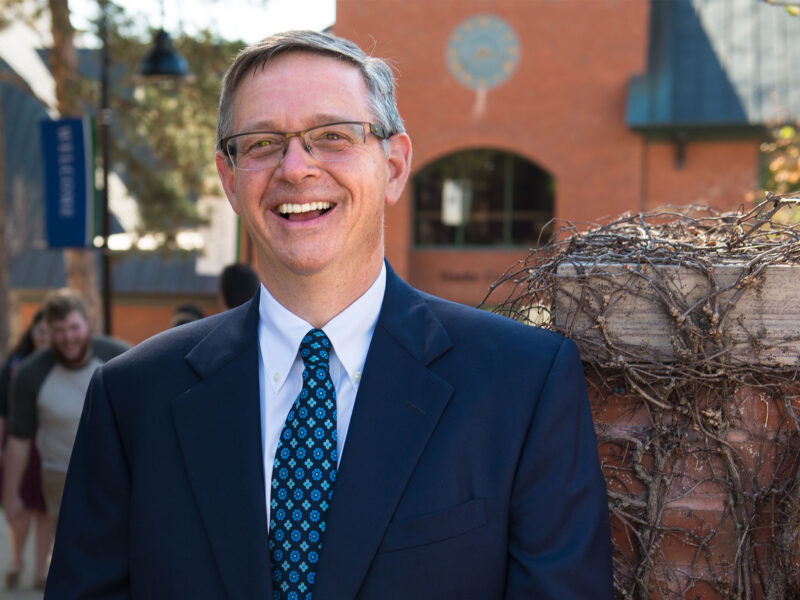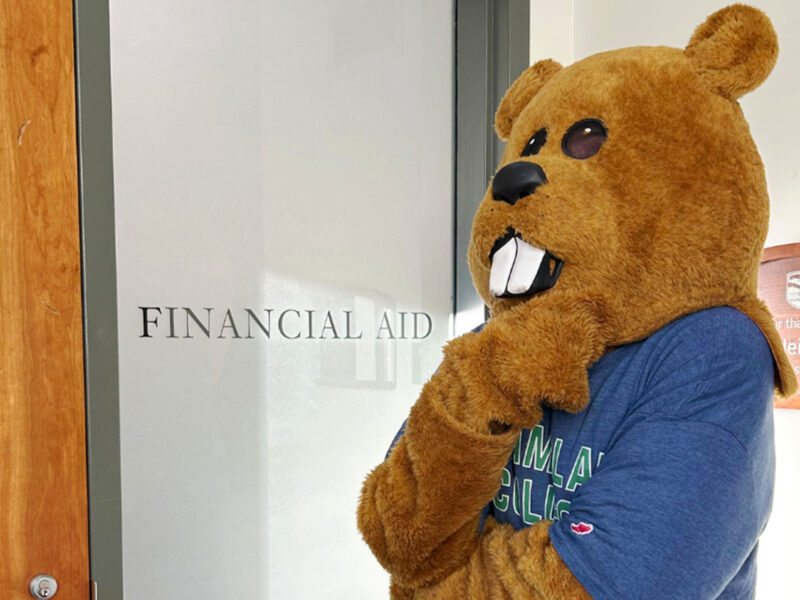How Champlain is Planning to Reopen Campus Safely

As Champlain welcomes back to campus a smaller than usual cohort of students, its number one priority is the health and safety of everyone in the community.
College move-in can feel like an emotional roller coaster in any year, but especially during a time when the entire world has been turned upside down by a global pandemic. Excitement, fear, anticipation, loneliness, joy—students might be feeling any or all of these emotions as they wave goodbye to their families and settle into their dorms.
In a usual year, their families drive away feeling proud, anxious, and maybe even relieved, but this year everything is different. This year, a formidable virus has put much of the world at risk. And so, a group of experts at Champlain has labored nonstop over the last six months to ensure the safest possible return to school.
Collaborating With State and Local Officials
Before he assumed his role as Champlain’s new President, Dr. Benjamin Ola. Akande worked from afar to assemble a team that would draft and implement plans to reopen the College safely. Specialists from Champlain’s Health & Wellness Center to Campus Public Safety, Residential Life to the President’s Office and more, collaborated with officials from the Governor’s office, the Mayor’s office, Burlington City Council, and Vermont’s Department of Health.

Dr. Akande also tapped a former public safety commissioner and recently retired FBI Assistant Director, Mr. Kerry Sleeper, as a special advisor. Sleeper, a Champlain ’76 alum (whose mother and two brothers also graduated from Champlain), had been recruited early in the crisis by Vermont Governor Phil Scott to oversee the state’s emergency operations center and serve as his interim deputy secretary.
Now, half a year into the pandemic, Vermont has had the fewest cases of COVID-19 of any state in the country, thanks in no small part to the data-driven and aggressive measures taken by Governor Scott and his team. Vermonters responded in kind, by wearing masks, social distancing, and exhibiting an enormous amount of care and social trust.
As Vermont writer, Bill McKibben, wrote in The New Yorker, “It’s pretty hard to argue with how Scott has handled the state’s present—he started wearing a mask early in the pandemic and has stood at the back of the room in many of the state’s coronavirus briefings, letting Dr. Mark Levine, Vermont’s answer to Dr. Anthony Fauci, dominate proceedings.”
Sleeper began consulting for Champlain soon after the state’s emergency plans had been implemented and community spread of the virus was low, though he remains in touch with Vermont officials. “The team here at Champlain has been in constant dialogue with the Governor’s office, health commissioner Dr. Mark Levine, the Mayor’s office, and City Council,” says Sleeper. “We’re following their directives and going above and beyond to implement and encourage safe behavior. Our Medical Director, Annika Hawkins-Hilke, is communicating with health officials almost on a daily basis.”

The team here at Champlain has been in constant dialogue with the Governor’s office, health commissioner Dr. Mark Levine, the Mayor’s office, and City Council. We’re following their directives and going above and beyond to implement and encourage safe behavior.
Kerry Sleeper, Special Advisor to the President of Champlain
So what is the College doing to ensure the safety of everyone, including students, faculty, staff, and the Burlington community? A strict regimen of testing, monitoring, isolating, and tracing, plus a campus-wide commitment to comprehensive public health rules. Low community spread has made all of these mitigation measures possible.
Champlain College Community Health Pledge
Champlain students returning to campus are required to sign and abide by a comprehensive health pledge that asks them to commit to wearing masks at all times, physically distancing, quarantining on campus or in their own homes, monitoring and reporting their symptoms, keeping informed, and more. During quarantine, students will not be allowed off campus. They will be restricted to their own residence halls, outdoor campus areas (as long as they follow safety measures), and the Dining Hall. Students who fail to follow the pledge will face disciplinary action, which may include being removed from campus. Once quarantine is lifted, students will be allowed to move about like other Vermonters, but will need to comply with the strict public health rules outlined in the pledge.

Testing
Another step Champlain is taking to keep campus and the surrounding community safe, is a focus on testing. “We will be conducting weekly COVID-19 testing on campus, organized and paid for by the College,” says Dr. Akande. “This testing regimen goes beyond guidelines set by the Centers for Disease Control and the Vermont Department of Health, and will provide a snapshot in time each week of how we are mitigating COVID-19 on our campus. We will require each member of our community, including students, faculty, and staff, to participate in the weekly testing.” Champlain is using a diagnostic test that detects the virus’s genetic material in a sample taken by nasal swab.
Monitoring
Students will also need to monitor their health through an app provided by the College. They will be asked to take their temperature and record their symptoms daily. If anything sets off an alarm, students will be required to stay in their rooms or move to an isolation unit. Students who live off campus will be asked to stay at home.
Isolating and Tracing
If a student does test positive for COVID-19 or comes into contact with an infected person, the individual will be moved from their residence hall or off-campus residence immediately to one of Champlain’s four designated isolation buildings. Meals will be delivered to them and their health will be monitored closely by the Student Health & Wellness Center. Their information will be sent to the Vermont Department of Health, which will begin to trace all of their contacts.
Creating a Safe Environment for Learning
Champlain has introduced a number of other health precautions to keep the community safe. All dorms will be limited, primarily, to single-occupancy rooms to minimize transmission of the virus among students. Fewer students will return to campus, and those who do come back from areas other than Vermont must quarantine for two weeks on campus or at home and be tested shortly after they arrive in Burlington. Visitors, including families helping with move-in, are strictly limited or prohibited, to help curb spread within the community. Cleaning and sanitizing will be stepped up everywhere, density in classrooms, dining hall, and other public spaces will be reduced, and plexi-glass dividers will be added throughout buildings on campus. The Campus Public Safety team will be more visible on campus as they encourage everyone to stay safe and follow the rules.

Of course learning is the ultimate priority of everyone in the Champlain community. Faculty have spent the summer redesigning their classes for the Flex-Hybrid format, which allows for both on campus and virtual learning. Whether a class is offered in person, or through remote synchronous and asynchronous instruction, professors are focusing on community building, collaboration, and one-on-one coaching. “It’s forcing us to rethink how we do just about everything,” says Keith Oppenheim, an Associate Professor in Champlain’s Broadcast Media Production program.
Facing the Future With Uncommon Resilience
Last weekend’s move-in was a quiet affair. Typically, hundreds of students and their families pack Finney Quad where Orientation Leaders and the Student Life team welcome them with open arms. This year, students approached check in alone or with two family members. They had to haul their bags, boxes, and mini fridges on their own or with the help of Champlain’s Physical Plant. Throughout the experience, the incoming students appeared remarkably mature for their age. They’ve been through so much already—from virtual proms to virtual high school graduations—perhaps the pandemic has taught them to be extra resilient and forced them to grow up quickly.

“As I watched the class of 2024 move into the Victorian mansion dorms on Saturday afternoon I saw young people who are getting ready to transform our world as we know it,” says Dr. Akande. “They are resilient, prepared, and ready to persevere in the midst of the greatest challenge the world has faced this century. It’s going to be a remarkable ride into the future with this class of 2024, and I’m eager to to be on this journey with them.”
Author
Related News



Mentored by their professor, two Champlain College students gain international recognition for groundbreaking research that helps secure privacy in big data.
More Inside The View
Ideas
From the minds of our students, faculty, and alumni.
News
The latest from Champlain College.
People
Champlain is more than just a place; it's a community.
Places
On campus, in Burlington, and beyond.
Events
Check out our many campus events and get involved! Refine your search by using the filters or monthly view options.